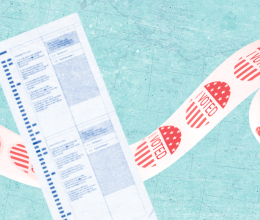On May 23, 2018, the ACLU of Ohio filed a lawsuit challenging Ohio's Federal Congressional District maps.
- Who is lawsuit is brought against?
- The lawsuit is brought against Ohio Secretary of State John Husted, Ohio Senate Majority Leader Larry Obhof, and Interim House Speaker Ryan Smith.
- Who is the ACLU representing in the lawsuit?
- The ACLU of Ohio and the ACLU Voting Rights Project are representing 5 organizational plaintiffs, Ohio’s A. Phillip Randolph Institute, the League of Women Voters of Ohio, The Ohio State University College Democrats, the Northeast Ohio Young Black Democrats, and the Hamilton County Young Democrats.
- The ACLU is also representing individual plaintiffs in all 16 of Ohio’s U.S. Congressional districts.
- Where is the lawsuit filed?
- United States District Court for the Southern District of Ohio.
- Which legislative map is this lawsuit challenging?
- This lawsuit is challenging Ohio’s U.S. congressional district map.
- Could this lawsuit prevent partisan gerrymandering of other types of legislative maps?
- Yes. Our lawsuit seeks to establish standards to prevent partisan bias in the redistricting process, which can be enforced in court to prevent and address partisan gerrymandering in all types of legislative maps.
- Does this lawsuit challenge the recent Ohio ballot initiative, “Issue 1,” that was passed on May 8, 2018 addressing how congressional districts are drawn?
- No. Our lawsuit challenges the current congressional map. The ballot initiative will determine how future maps are drawn after the next Census. The first map under Issue 1’s rules would be drawn in 2021, and would not come into effect until the 2022 election cycle. The lawsuit does not address the process by which maps are drawn. Instead, it seeks to establish standards to ensure that maps—however they are drawn—are fair.
- The map was drawn in 2012, but the ACLU is challenging it in 2018. Why bring the action now?
- The damage caused by this map has unfolded over 3 election cycles (2012, 2014, and 2016), making it crystal clear that the map is a partisan manipulation that denies Ohioans opportunity to have their political voices heard. Also, the law and the social scientific methodology for measuring gerrymandering have developed helpfully during this time.
- Is the ACLU working with political parties to bring this lawsuit?
- No, the ACLU is a non-partisan organization and this lawsuit was brought without the aid or input of any political party. We have supported voters from both parties challenging partisan-drawn districts—including Republican voters who challenged Democratic gerrymandering in Maryland before the U.S. Supreme Court earlier this year.
- Will this lawsuit impact the 2018 elections?
- It is very unlikely that this lawsuit will address the 2018 elections as the legal process takes some time. This lawsuit will likely impact the 2020 elections.
- What is the ACLU hoping to achieve through this litigation?
- We seek a new, fair, congressional map to cover the remaining Ohio congressional elections for the rest of this decade, including in the November 2020 election.
- We also seek to create stronger standards to ensure partisan fairness for districts drawn in the future. This will ensure that no matter what processes will be used to draw maps, the rules put in place by our lawsuit will protect the process from manipulation and foul play.
- How will our lawsuit be affected once the U.S. Supreme Court decides the current partisan gerrymandering cases before it — Gill v. Whitford, challenging Wisconsin’s legislative map, and Benisek v. Lamone, challenging a U.S. congressional district in Maryland?
- The Court’s decision will help guide the federal court that hears our case.





